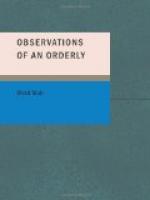Briggs, a civilian once more, sported reach-me-down garments which fitted him surprisingly—our Clothing Store sergeant is the kindest of souls and expends infinite patience on doing his best, with government-contract tailoring, to suit all our discharges. His overcoat, which might have been called a Chesterfield in Shoreditch, pleased Briggs, as he told me in the car: he drew my attention to its texture and warmth, he admiringly fingered it. “I might ha’ paid thirty bob for that there top-coat,” he surmised. “A collar an’ a tie an’ all, too! Them boots ain’t so dusty, neither: they fit me a treat. Goin’ ’ome to my missus in Sunday clobber, I am.” You would have said that he thought he had emerged from his hazards with rather a good bargain. A jumble of ready-made clothes—and a pension! The visible world gone for ever! These were his souvenirs of the great war. And, “Ah,” he said, when I ventured on some allusion to his blindness, “it might ha’ bin worse. I don’ know what I’d ha’ done if I’d lost a leg, same as some of them other poor jossers in th’ hospital!”
(And this, marvellous though it sounds, is the standpoint of no small number in the legion of our Briggses.)
The motor ride was another source of gratification to Briggs. Seated beside me, the wind beating on his sightless orbs, he discoursed of the wonders of petrol. “Proper to take you about, them cars. W’ere are we now? ’Ave we far to run, like?” I told him we were traversing Battersea Park and that our destination was St. Pancras. It transpired that he was a stranger to London. This drive through London was, as it were, an item in his collection of experiences, to be preserved with the cross-channel voyage and the vigils in the trenches. “Shall we go by Buckingham Palace?” I told him we shouldn’t; then, observing that he was disappointed, I asked the driver to make the detour. So at last I was able to inform Briggs that we were passing Buckingham Palace: I turned his head so that he looked straight towards that architectural phenomenon. It was, of course, invisible to him. No matter. He wished to be able to boast, to his wife, that he had seen (he used that verb) the house where the King lived.
His wife—he married a month before he enlisted—had been notified of his return; but I suggested that at St. Pancras we might telegraph to her the actual hour of the train’s arrival, in case she should desire to meet it. The idea commended itself to Briggs: he had not thought of such a thing: telegraphing had perhaps hardly come within his purview, at least so I surmised when, the telegraph-form before me, I asked him what he wished me to write. He began cheerily, as though dictating a letter of gossip:—“My dear wife—” Economy necessitated a taboo of this otherwise charming method of communication. “Arriving Bradford five-thirty, Tom,” was the result of final boilings-down, which took so long that we nearly achieved the anticlimax of missing our train altogether.




